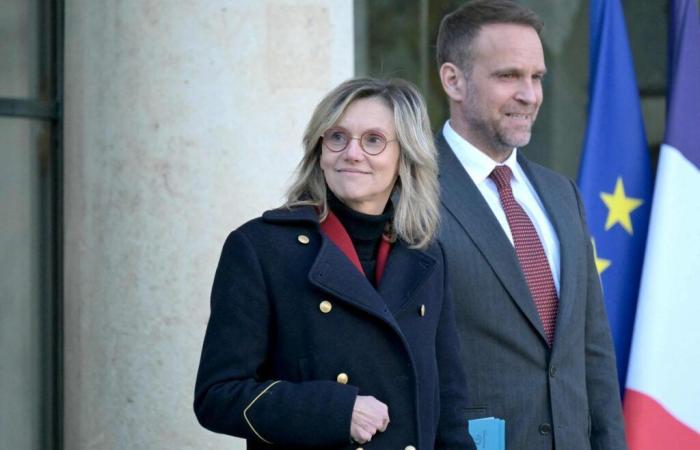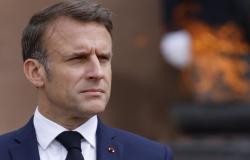IThere will be no state of grace. On January 22, Agnès Pannier-Runacher will have to deal with the bad mood of the fishing world, faced for the second time with the ban on fishing for thirty days in the Bay of Biscay – the maritime coast of New Aquitaine – for boats over 8 meters. The motive? Safeguarding accidentally captured cetaceans, dolphins and porpoises. This is how the Minister of Ecological Transition, Biodiversity, Forest, Sea and Fisheries will go to the fire on two of her powers, apparently contradictory in this case: the protection of living things and that of fishermen.
The person concerned will know how to adapt. This early Macronist, “Walker” since 2016, has slipped into colorful ministerial clothes since the fall of 2018. Secretary of State, delegated minister, full minister, she worked with Bruno Le Maire ( Economy and Finance) and Marc Fesneau (Agriculture) and took up the Energy Transition, then the Ecological Transition.
Political performance, she has known all the Prime Ministers of Emmanuel Macron: Édouard Philippe, Jean Castex, Élisabeth Borne, Gabriel Attal, Michel Barnier and now François Bayrou. His longevity earned him a membership card in a small club of almost irremovable members of the two five-year terms.
Lack of levers for action
The extensive inventory in his wallet may recall the trinkets of a Soviet general, but the Ecological Transition is no longer what it used to be. It was better before, it seems. Nicolas Hulot, a great political veteran, was Minister of State and number three in the government. Agnès Pannier-Runacher is today twelfth in the protocol order, in the anonymity of the peloton.
“The term “climate” has disappeared from the title of the ministry and Energy has moved to Bercy”
“She is above all Minister of Biodiversity. In fact, climate affairs escape him. Housing, transport, energy and industry are not its responsibility. These are all the levers for action to reduce greenhouse gas emissions! » observes Girondin Jean-François Julliard, the general director of Greenpeace France. “The term “climate” has disappeared from the title of the ministry and Energy has moved to Bercy,” adds Nicolas Thierry, the deputy (EELV) for Bordeaux.
It is the new kid Marc Ferracci who is today Minister of Industry and Energy, under the tutelage of the big financier Éric Lombard. Agnès Pannier-Runacher acts as if nothing had happened. She wasn't on the big ministerial trip to Mayotte at the start of the week, when François Bayrou spoke there on the use of wood brought down by Cyclone Chido? “I am expanding my portfolio to include everything related to forestry, maritime and fishing issues, and I am maintaining the decarbonization of all sectors, including energy,” she retorted ago a few days on RTL. “The climate remains well and truly within the purview of the ministry,” supports his office.
The revival of nuclear power on the horizon
Beyond the endless debates on its scope, it is the record of Agnès Pannier-Runacher, her convictions and her freedom of maneuver which leave environmental activists doubtful. When she was appointed to the Energy Transition in May 2022, we mocked the upper-class woman whose only experience in the field was family: she is the daughter of Jean-Michel Runacher, former director of the French oil company Perenco.
She took advantage of the energy crisis to print. She carried the sobriety plan, a notion hitherto unknown to Macronist doxa, before the subject fell back again in the pile of priorities. Last fall, she put back on track the basic documents of the French climate and energy roadmap – the multi-annual energy program, the national low-carbon strategy – victims of the casualness of the Attal government. And she firmly refused to go to COP 29 in Baku in November, in response to the vehement statements against France by Azeri President Ilham Aliev.
But on energy issues, it remains very marked “little soldier of macronism”, with the horizon of the relaunch of nuclear power. “We have never heard him express the slightest nuance or any personal opinion on these subjects,” regrets Georges Cingal, the secretary general of Sepanso Aquitaine, which brings together a number of nature defense associations.
The battle of pesticides
Refocused “minister of the living”, the one who passed the pitfall of the legislative elections in July – elected in Pas-de-Calais – will not lack tense issues. Faced with her colleague from Agriculture, Annie Genevard, “who adopts catastrophic positions, we expect her to defend the application of the regulations and to resurrect the Écophyto plan [la réduction de l’usage des pesticides, NDLR] torpedoed by Gabriel Attal,” says François Veillerette, spokesperson for Générations futures, an anti-pesticide association. Nicolas Thierry is not convinced. “She’s a technosolutionist [quelqu’un qui pense que la solution passe par l’innovation technique, NDLR] in the Macronist tradition. It seems to me above all to reassure large industrialists. Which explains why she remains in the government,” he judges with a touch of cruelty. “She is one of those people who believe or pretend to believe that voluntary approaches have the power to solve ecological problems. So we need clear regulations,” says Georges Cingal in turn.
Agnès Pannier-Runacher nevertheless stood out from the ranks, a little. In November, she spoke out “in a personal capacity” against the return of neonicotinoids, a class of insecticides dangerous for humans and ecosystems. On the drop in greenhouse gas emissions, which Emmanuel Macron welcomed during his televised greetings, she brought a slight downside by pointing out a slowdown in the pace. “We must not let our guard down. Climate inaction has a cost for the French,” she warned. Does this word carry to the table of the Council of Ministers?






